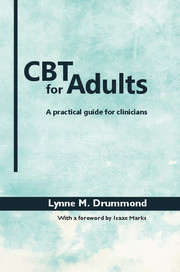Book contents
- Frontmatter
- Dedication
- Contents
- List of tables, boxes, figures and case examples
- Foreword
- Preface
- Structure of the book
- List of abbreviations
- 1 Introduction
- 2 Assessment
- 3 Rules of reinforcement and practical examples
- 4 Social skills training
- 5 Relationship, communication and sexual skills training
- 6 Phobic and social anxiety
- 7 Treatment of obsessive–compulsive disorders
- 8 Depression
- 9 Generalised anxiety disorder and panic
- 10 Body dysmorphic disorder and the somatic symptom and related disorders
- 11 Eating disorders
- 12 Addictive behaviour
- 13 Schizophrenia and the psychoses
- 14 Personality disorder
- 15 CBT in combination with other therapy
- Glossary
- Index
5 - Relationship, communication and sexual skills training
Published online by Cambridge University Press: 01 January 2018
- Frontmatter
- Dedication
- Contents
- List of tables, boxes, figures and case examples
- Foreword
- Preface
- Structure of the book
- List of abbreviations
- 1 Introduction
- 2 Assessment
- 3 Rules of reinforcement and practical examples
- 4 Social skills training
- 5 Relationship, communication and sexual skills training
- 6 Phobic and social anxiety
- 7 Treatment of obsessive–compulsive disorders
- 8 Depression
- 9 Generalised anxiety disorder and panic
- 10 Body dysmorphic disorder and the somatic symptom and related disorders
- 11 Eating disorders
- 12 Addictive behaviour
- 13 Schizophrenia and the psychoses
- 14 Personality disorder
- 15 CBT in combination with other therapy
- Glossary
- Index
Summary
Overview
This chapter will look at human interaction and how skills can be developed to improve it. Although often described as ‘marital’, many of these techniques can be used in any relationship and between people of any gender and age. The chapter will start by examining behavioural exchange methods and then move on to examining communication skills and how these may be improved. Mention will be made of the newer integrative couple therapy and how this can be used in treatment. Finally, there will be a description of sexual skills acquisition using graded exposure and sexual skills training. Although the case histories cited involve heterosexual couples, identical techniques can be used with homosexual couples.
People are sociable beings and thus tend to live together. In general, most people are happiest when living in close proximity to other people with whom they have a close bond. However, these relationships can frequently be marred by simple misunderstandings or basic lack of skills. In this chapter, we will be examining three different aspects and approaches to improving poor relationships. Much of the research in these mainly behavioural techniques was performed in the 1970s and 1980s and with married couples. There is no reason why the techniques should be restricted to such a group, however, and many can be extended beyond the marital relationship as well, of course, as being useful in same-sex couples. These three approaches are:
• behavioural exchange therapy (reciprocity negotiation training)
• communication skills training
• sexual skills training.
In recent years these simple behavioural interventions have tended to be overlooked in favour of more complex paradigms, such as those used in systemic therapy. A review of the literature in 1996 (Wesley & Waring) performed a meta-analysis examining the outcome of behavioural marital therapy, cognitively oriented marital therapy, emotionally focused marital therapy and insight-oriented marital therapy. The authors found good evidence for the efficacy of each of these four methods but were unable to demonstrate any clear advantage of one rather than any other and also found no evidence for particular problems responding preferentially to any one type of therapy. Behavioural interventions are simple to learn and effective and thus can be widely applied, often in combination with other treatments.
- Type
- Chapter
- Information
- CBT for AdultsA Practical Guide for Clinicians, pp. 53 - 72Publisher: Royal College of PsychiatristsPrint publication year: 2014



